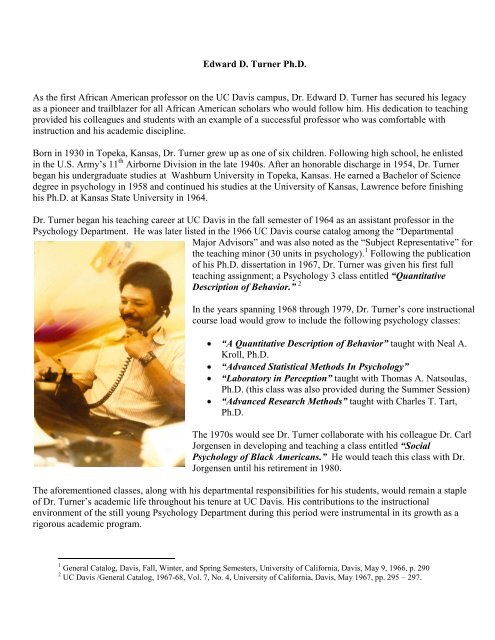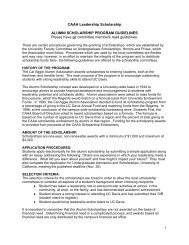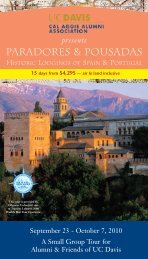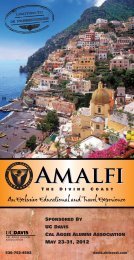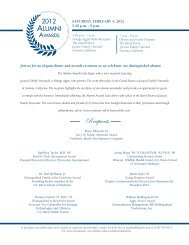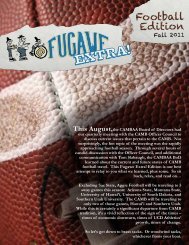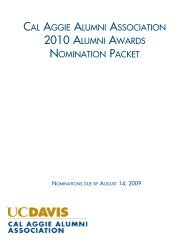Edward D. Turner Ph.D. As the first African American ... - UC Davis
Edward D. Turner Ph.D. As the first African American ... - UC Davis
Edward D. Turner Ph.D. As the first African American ... - UC Davis
Create successful ePaper yourself
Turn your PDF publications into a flip-book with our unique Google optimized e-Paper software.
<strong>Edward</strong> D. <strong>Turner</strong> <strong>Ph</strong>.D.<br />
<strong>As</strong> <strong>the</strong> <strong>first</strong> <strong>African</strong> <strong>American</strong> professor on <strong>the</strong> <strong>UC</strong> <strong>Davis</strong> campus, Dr. <strong>Edward</strong> D. <strong>Turner</strong> has secured his legacy<br />
as a pioneer and trailblazer for all <strong>African</strong> <strong>American</strong> scholars who would follow him. His dedication to teaching<br />
provided his colleagues and students with an example of a successful professor who was comfortable with<br />
instruction and his academic discipline.<br />
Born in 1930 in Topeka, Kansas, Dr. <strong>Turner</strong> grew up as one of six children. Following high school, he enlisted<br />
in <strong>the</strong> U.S. Army’s 11 th Airborne Division in <strong>the</strong> late 1940s. After an honorable discharge in 1954, Dr. <strong>Turner</strong><br />
began his undergraduate studies at Washburn University in Topeka, Kansas. He earned a Bachelor of Science<br />
degree in psychology in 1958 and continued his studies at <strong>the</strong> University of Kansas, Lawrence before finishing<br />
his <strong>Ph</strong>.D. at Kansas State University in 1964.<br />
Dr. <strong>Turner</strong> began his teaching career at <strong>UC</strong> <strong>Davis</strong> in <strong>the</strong> fall semester of 1964 as an assistant professor in <strong>the</strong><br />
Psychology Department. He was later listed in <strong>the</strong> 1966 <strong>UC</strong> <strong>Davis</strong> course catalog among <strong>the</strong> “Departmental<br />
Major Advisors” and was also noted as <strong>the</strong> “Subject Representative” for<br />
<strong>the</strong> teaching minor (30 units in psychology). 1 Following <strong>the</strong> publication<br />
of his <strong>Ph</strong>.D. dissertation in 1967, Dr. <strong>Turner</strong> was given his <strong>first</strong> full<br />
teaching assignment; a Psychology 3 class entitled “Quantitative<br />
Description of Behavior.” 2<br />
In <strong>the</strong> years spanning 1968 through 1979, Dr. <strong>Turner</strong>’s core instructional<br />
course load would grow to include <strong>the</strong> following psychology classes:<br />
“A Quantitative Description of Behavior” taught with Neal A.<br />
Kroll, <strong>Ph</strong>.D.<br />
“Advanced Statistical Methods In Psychology”<br />
“Laboratory in Perception” taught with Thomas A. Natsoulas,<br />
<strong>Ph</strong>.D. (this class was also provided during <strong>the</strong> Summer Session)<br />
“Advanced Research Methods” taught with Charles T. Tart,<br />
<strong>Ph</strong>.D.<br />
The 1970s would see Dr. <strong>Turner</strong> collaborate with his colleague Dr. Carl<br />
Jorgensen in developing and teaching a class entitled “Social<br />
Psychology of Black <strong>American</strong>s.” He would teach this class with Dr.<br />
Jorgensen until his retirement in 1980.<br />
The aforementioned classes, along with his departmental responsibilities for his students, would remain a staple<br />
of Dr. <strong>Turner</strong>’s academic life throughout his tenure at <strong>UC</strong> <strong>Davis</strong>. His contributions to <strong>the</strong> instructional<br />
environment of <strong>the</strong> still young Psychology Department during this period were instrumental in its growth as a<br />
rigorous academic program.<br />
1 General Catalog, <strong>Davis</strong>, Fall, Winter, and Spring Semesters, University of California, <strong>Davis</strong>, May 9, 1966, p. 290<br />
2 <strong>UC</strong> <strong>Davis</strong> /General Catalog, 1967-68, Vol. 7, No. 4, University of California, <strong>Davis</strong>, May 1967, pp. 295 – 297.
Dr. <strong>Turner</strong>’s contributions to <strong>the</strong> growth and development of ethnic studies programs on <strong>the</strong> <strong>UC</strong> <strong>Davis</strong> campus<br />
also cannot be overlooked. <strong>As</strong> noted in <strong>the</strong> University of California Digital Archives (2004):<br />
“During <strong>the</strong> spring of 1969 some 50 <strong>African</strong>-<strong>American</strong> students, accompanied by psychology professor Ed<br />
<strong>Turner</strong>, <strong>the</strong> sole <strong>African</strong>-<strong>American</strong> faculty member on campus, marched on <strong>the</strong> Chancellor's office to demand,<br />
in part, creation of a Department of <strong>African</strong>-<strong>American</strong> Studies. The negotiations begun by Chancellor Emil<br />
Mrak were continued under Chancellor James Meyer. It was decided to create an <strong>African</strong>-<strong>American</strong> Studies<br />
Program, and FTE were set aside for faculty with expertise in <strong>the</strong> black experience. Ed <strong>Turner</strong>, appointed<br />
Director of Black Studies, consulted with a newly formed curriculum development committee consisting of<br />
black political sociologist and Berkeley graduate student Hardy Frye, black cultural geographer and <strong>UC</strong>D<br />
lecturer Charles C. Irby, and white political sociologist John Leggett. Their report "Whi<strong>the</strong>r Black Studies,"<br />
produced in August 1971, became <strong>the</strong> program's planning document. 3<br />
Dr. <strong>Turner</strong>’s contributions to <strong>the</strong> initial development of <strong>UC</strong> <strong>Davis</strong>’ Black Studies program enabled <strong>the</strong><br />
recruitment of <strong>the</strong> professors, administrators and students who would take <strong>the</strong> program to its next level. Over <strong>the</strong><br />
next 30 years, a number of competent scholars and administrators, as well as hard working students worked to<br />
ensure <strong>the</strong> programs permanence on campus.<br />
Dr. <strong>Turner</strong> advised and supported <strong>the</strong> <strong>African</strong> <strong>American</strong> faculty who joined him at <strong>UC</strong> <strong>Davis</strong>. He also worked<br />
with university staff to make <strong>UC</strong> <strong>Davis</strong> a more supportive environment for students of color, and to assist<br />
students of all ethnicities facing financial difficulties or in need of social support. His house was a meeting<br />
place for politically disaffected persons. Dr. <strong>Turner</strong> greatly contributed to <strong>the</strong> morale and cohesion of <strong>UC</strong><br />
<strong>Davis</strong>'s <strong>African</strong> <strong>American</strong> community.<br />
The <strong>UC</strong> <strong>Davis</strong> <strong>African</strong> <strong>American</strong> and <strong>African</strong> Studies Program and <strong>the</strong> broad range of <strong>African</strong> <strong>American</strong><br />
academic and social support organizations now located on <strong>the</strong> <strong>UC</strong> <strong>Davis</strong> campus are a testament and a validation<br />
of <strong>the</strong> vision and accomplishments of Dr. <strong>Turner</strong>, his colleagues and <strong>the</strong> students of his era and beyond. The<br />
<strong>Edward</strong> D. <strong>Turner</strong> Memorial Golf Tournament and its goal of establishing an endowment for <strong>the</strong> <strong>African</strong><br />
<strong>American</strong> and <strong>African</strong> Studies Program and for student scholarships is a fitting tribute to Dr. <strong>Turner</strong>’s legacy and<br />
all he sought to accomplish at <strong>UC</strong> <strong>Davis</strong>.<br />
3 “<strong>African</strong>-<strong>American</strong> and <strong>African</strong> Studies”, University of California Digital Archives, Regents of <strong>the</strong> University of<br />
California, 1999 – 2005.


